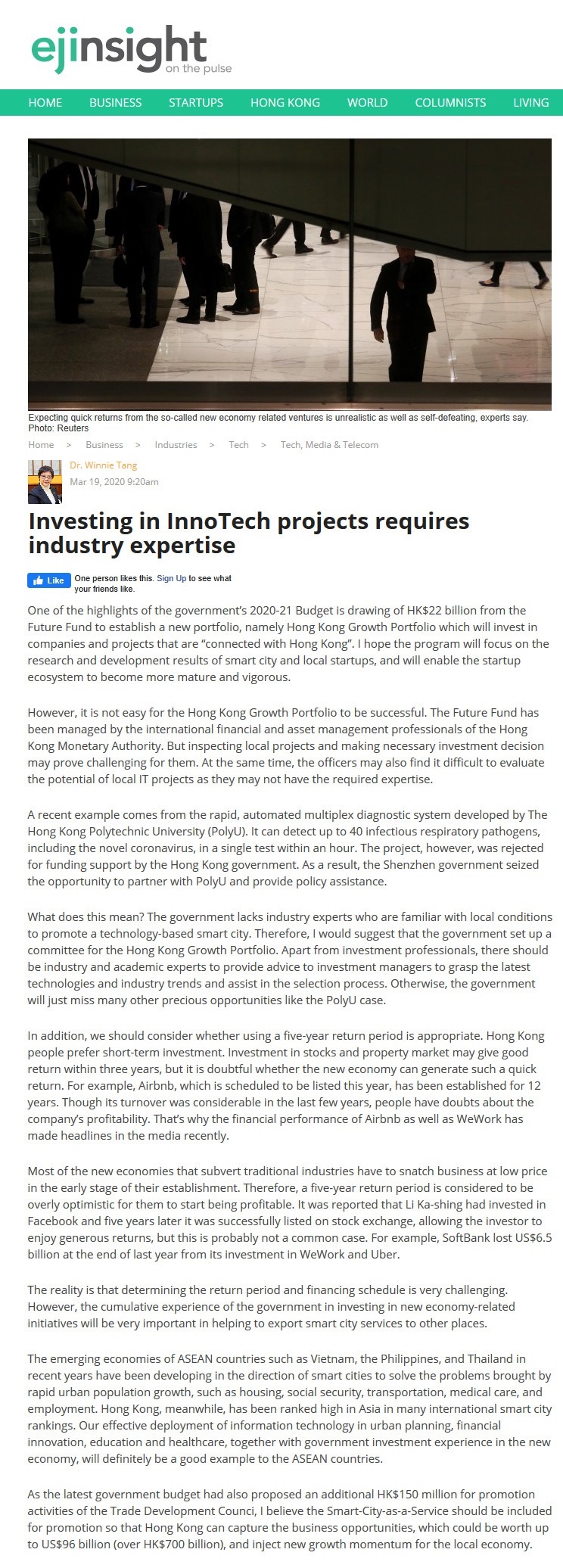網上版請按此

Investing in InnoTech projects requires industry expertise
One of the highlights of the government's 2020-21 Budget is drawing of HK$22 billion from the Future Fund to establish a new portfolio, namely Hong Kong Growth Portfolio which will invest in companies and projects that are "connected with Hong Kong". I hope the program will focus on the research and development results of smart city and local startups, and will enable the startup ecosystem to become more mature and vigorous.
However, it is not easy for the Hong Kong Growth Portfolio to be successful. The Future Fund has been managed by the international financial and asset management professionals of the Hong Kong Monetary Authority. But inspecting local projects and making necessary investment decision may prove challenging for them. At the same time, the officers may also find it difficult to evaluate the potential of local IT projects as they may not have the required expertise.
A recent example comes from the rapid, automated multiplex diagnostic system developed by The Hong Kong Polytechnic University (PolyU). It can detect up to 40 infectious respiratory pathogens, including the novel coronavirus, in a single test within an hour. The project, however, was rejected for funding support by the Hong Kong government. As a result, the Shenzhen government seized the opportunity to partner with PolyU and provide policy assistance.
What does this mean? The government lacks industry experts who are familiar with local conditions to promote a technology-based smart city. Therefore, I would suggest that the government set up a committee for the Hong Kong Growth Portfolio. Apart from investment professionals, there should be industry and academic experts to provide advice to investment managers to grasp the latest technologies and industry trends and assist in the selection process. Otherwise, the government will just miss many other precious opportunities like the PolyU case.
In addition, we should consider whether using a five-year return period is appropriate. Hong Kong people prefer short-term investment. Investment in stocks and property market may give good return within three years, but it is doubtful whether the new economy can generate such a quick return. For example, Airbnb, which is scheduled to be listed this year, has been established for 12 years. Though its turnover was considerable in the last few years, people have doubts about the company's profitability. That's why the financial performance of Airbnb as well as WeWork has made headlines in the media recently.
Most of the new economies that subvert traditional industries have to snatch business at low price in the early stage of their establishment. Therefore, a five-year return period is considered to be overly optimistic for them to start being profitable. It was reported that Li Ka-shing had invested in Facebook and five years later it was successfully listed on stock exchange, allowing the investor to enjoy generous returns, but this is probably not a common case. For example, SoftBank lost US$6.5 billion at the end of last year from its investment in WeWork and Uber.
The reality is that determining the return period and financing schedule is very challenging. However, the cumulative experience of the government in investing in new economy-related initiatives will be very important in helping to export smart city services to other places.
The emerging economies of ASEAN countries such as Vietnam, the Philippines, and Thailand in recent years have been developing in the direction of smart cities to solve the problems brought by rapid urban population growth, such as housing, social security, transportation, medical care, and employment. Hong Kong, meanwhile, has been ranked high in Asia in many international smart city rankings. Our effective deployment of information technology in urban planning, financial innovation, education and healthcare, together with government investment experience in the new economy, will definitely be a good example to the ASEAN countries.
As the latest government budget had also proposed an additional HK$150 million for promotion activities of the Trade Development Counci, I believe the Smart-City-as-a-Service should be included for promotion so that Hong Kong can capture the business opportunities, which could be worth up to US$96 billion (over HK$700 billion), and inject new growth momentum for the local economy.
Dr. Winnie Tang
Adjunct Professor, Department of Computer Science, Faculty of Engineering and Faculty of Architecture, The University of Hong Kong